
The National Cultural Foundation
West Terrace,
St. James, Barbados
246-417-6610

todayJanuary 6, 2026

todayJanuary 5, 2026

todayJanuary 2, 2026
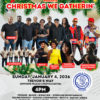
todayJanuary 1, 2026
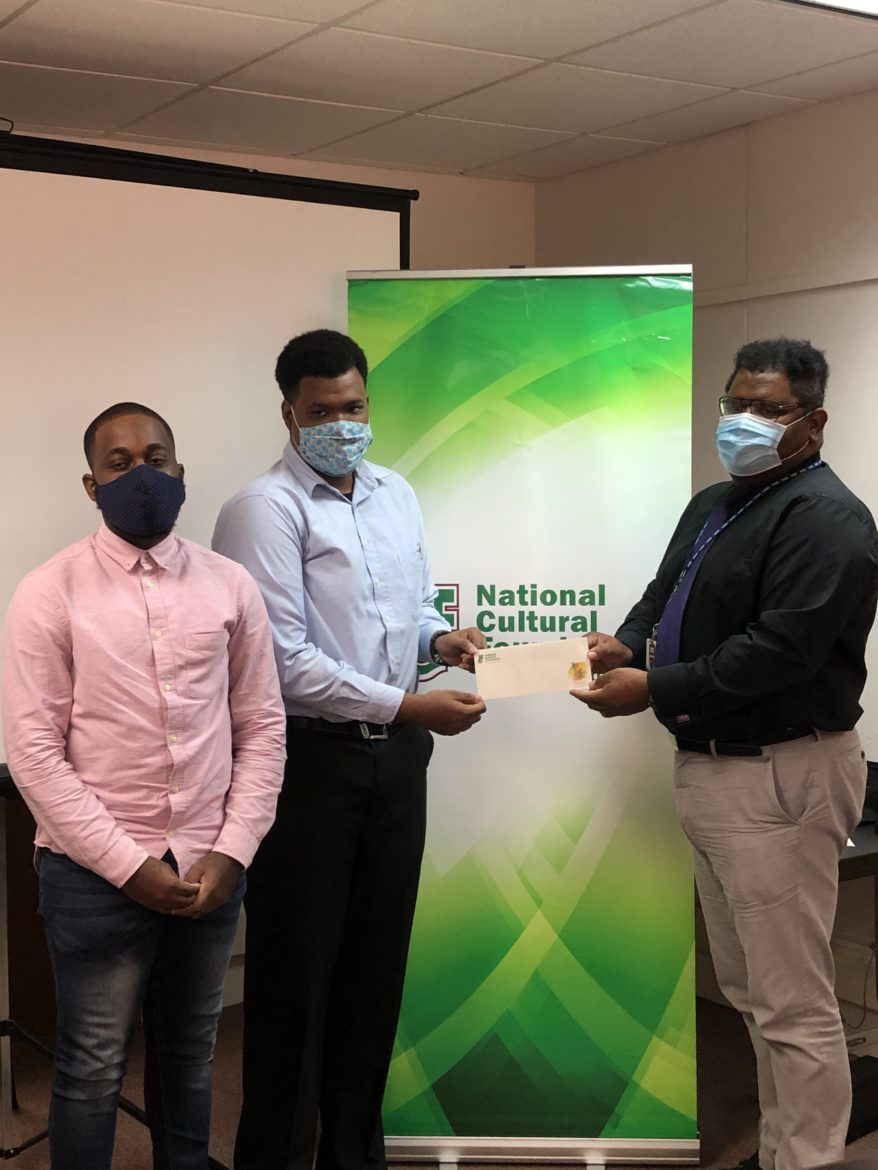
Arts & Culture - Literary ArtsNewsNews RoomNIFCA
todayNovember 23, 2025 97
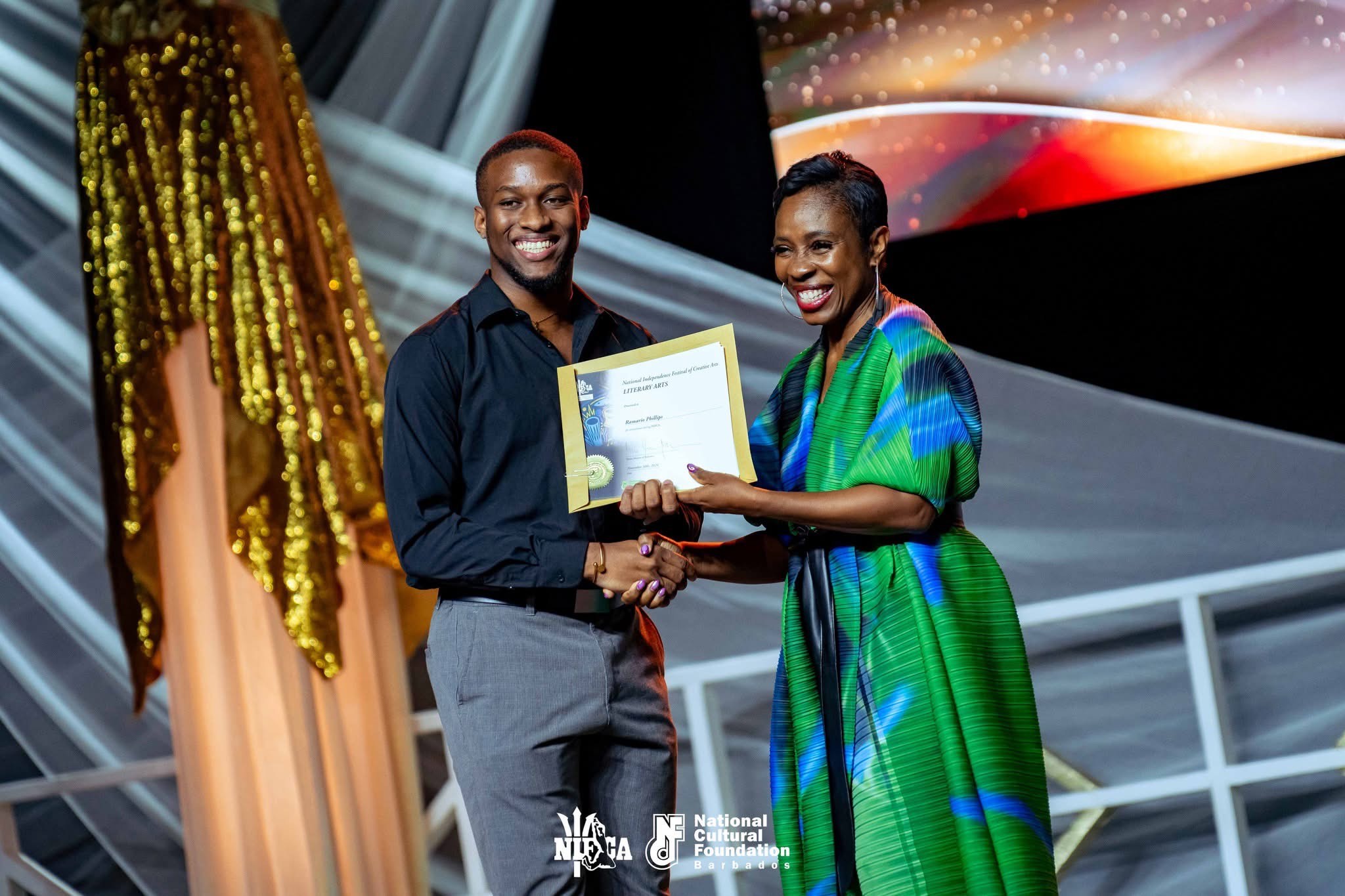
When Ramario Phillips thinks back to the moment writing truly entered his life, he returns to 2011: a junior bronze at NIFCA for a poem he never expected to travel so far. He had written Every Time I Climb a Tree for an inter-school competition, but his teacher, Sherryl Griffith, submitted it to NIFCA first. It won bronze there, then went on to secure Most Outstanding Poem in the school competition, eventually landing him a feature on Mornin’ Barbados. That early success echoed louder than the applause; it revealed to him that his words held weight on both the page and the stage. It was, he says, the moment he realised writing “had a real place” in his life.
More than a decade later, Phillips stands as one of the most compelling emerging voices in Barbados’ contemporary literary landscape — a poet, writer, and medical professional whose work moves with the pulse of memory, identity, and cultural truth-telling. His trajectory has been steady but intentional, carved out through discipline, mentorship, and a willingness to evolve.
Though he balances careers that might seem worlds apart, Phillips is clear about the bridge between them. Medicine, he says, shapes his writing in tangible ways: the language of the body, the precision of describing pain, the visceral reality of human fragility. Those details often slip into his metaphors and imagery. “The terms, the body, the way pain is described, all of that slips into my imagery,” he explains. Poetry, however, does not influence his medical practice. They remain two distinct paths that meet only where language demands it.

Introducing Ramario Phillips – a poet and storyteller.
While many writers trace their artistic call to particular memories or generational stories, Phillips’ fascination with heritage and identity comes from a deeper instinct. “It feels more like something internal,” he says, almost a gravitational pull toward the parts of Caribbean history that lie unspoken or suppressed. His Pan-Africanist leanings drive him to write into those fissures. His poems become acts of reclamation, speaking for the silences and shadows that colonial history tried to bury.
That instinct sharpened in his award-winning piece Wuh Sweat Yuh So?, which earned him NIFCA Gold and The Kamau Brathwaite Award of Excellence for Poetry this year. The poem signals a shift in his creative approach — one rooted unapologetically in dialect. “I’ve been writing in Standard English for so long, out of habit,” he says, but it could no longer carry the emotional breadth he wanted. Using Bajan and wider Caribbean language allowed him to express “the pain, the humour, the hurt, and the history” all at once. More importantly, he wanted to honour the language itself — its beauty, its rhythm, its cultural authority.
His relationship with NIFCA has deepened since that first junior bronze. In his early years, he submitted work without much thought beyond the thrill of participation. As he matured, he discovered that NIFCA offered far more, workshops, mentorship, and invaluable Meet the Judges sessions that pushed him to refine his craft. Since entering the adult category in 2023, he has collected six bronze, three silver, two gold awards, Best Manuscript, and the Kamau Brathwaite Award of Excellence. Those accolades are the result of discipline: listening to critique, rewriting relentlessly, and learning through mentorship.
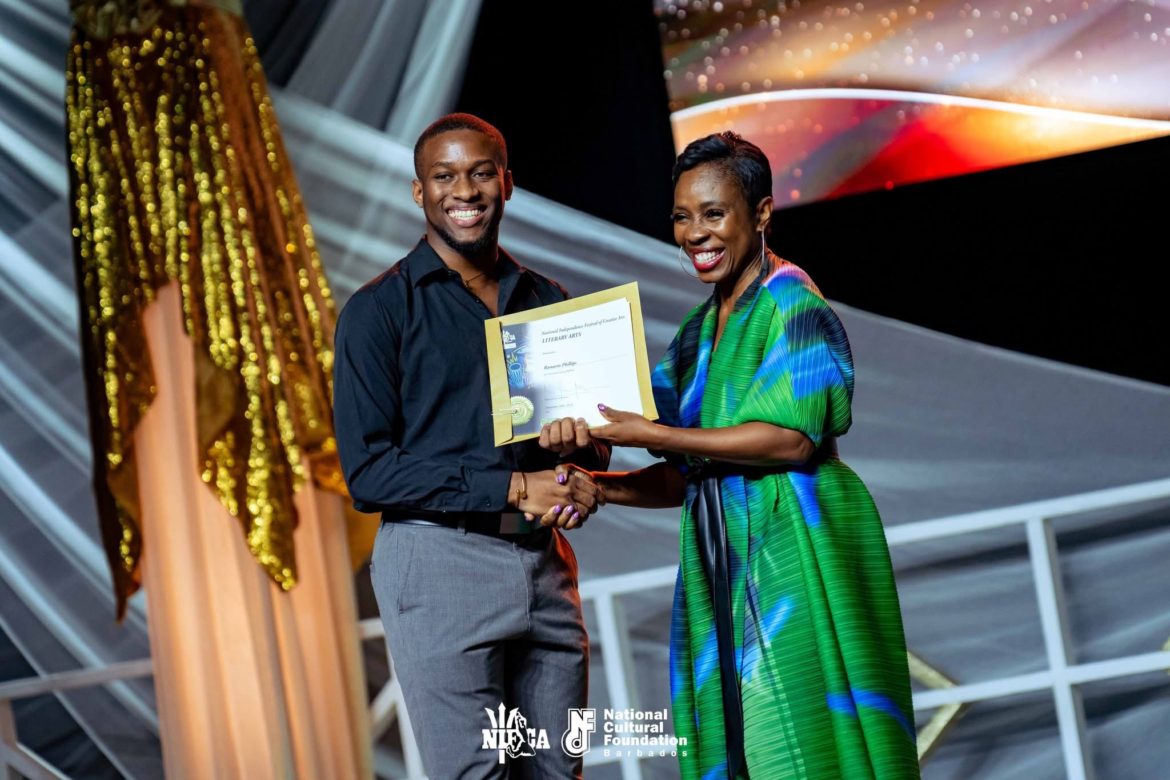
Ramario Phillips receiving his award from Sen. Dr The Hon Shantal Munro-Knight in 2024.
But perhaps the most transformative chapter unfolded this year when Phillips was shortlisted for the Frank Collymore Literary Endowment Award, earning the John Wickham Prize and a developmental editing scholarship. What followed was an intensive mentorship with acclaimed writer and academic Dr Loretta Collins Klobah. Those months reshaped him.
“She trained me intensively… and pushed me to recognise patterns in my work,” Phillips says. Her guidance urged him to diversify structure, ground his poems in historical documentation, and give readers something real to hold. It was during this mentorship that he encountered archival remnants that would permanently alter his understanding of Caribbean brutality — like the doctor’s account of enslaved men forced to “dance” on the deck of a slave ship while shackled. “How dare you bind me, force my body into brutality, and call it a choreography?” he asks. That single historical line now threads through the emotional and intellectual fabric of his writing. Another direct influence on Phillips is Paula Harper-Grant. Her work has been incredibly influential in how he approached his piece. “She tells a Barbadian story with such natural ease, and the way she uses Bajan language and dialect is exceptional,” Phillips said about his inspiration.
His process begins with emotion. He pours everything onto the page, later deciding whether the work needs the grounding of Standard English, the honesty of dialect, or something in between. Structure comes later — if at all. “Sometimes it becomes a poem,” he says, “and sometimes it doesn’t, and that’s okay.”
As the Caribbean literary space expands with new voices and cross-regional conversations, Phillips isn’t preoccupied with fitting neatly into a particular corner. Instead, he wants his work to contribute meaningfully to dialogues about memory, identity, Black survival, and the urgency of representation — standing alongside writers like Kamau Brathwaite, Yvonne Weekes, Richard Georges, Kei Miller, Nailah Imoja, Kerry Belgrave, and others shaping the region’s literary future.
Now overseas pursuing further medical specialisation, Phillips continues to write, revise, and re-envision his manuscript Soil Remembers — a title that captures the essence of his artistic mission. He is reading widely, experimenting with forms, and building community with other Caribbean and diaspora poets. His next major goal is publication. He is taking his time with the manuscript, shaping it with intention, strength, and clarity.
“I’m going to keep telling my story,” he says. “Keep honouring the stories buried in the soil because it does remember, and I’ll be here to tell you.”
For Phillips, poetry is not merely expression; it is excavation. And through his disciplined craft, the fragments of forgotten histories find their way back into the light. (PR)
Written by: Info NCF
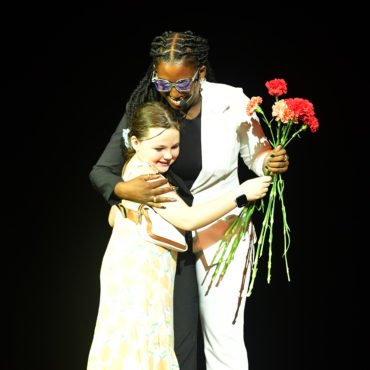
labelArts & Culture - Theatre Arts todayNovember 21, 2025
When Samantha Julien stepped onto the NIFCA stage to share her spoken word piece 1260, she carried with her far more than a poem. She carried the collective exhaustion, pride, frustration, and deep, [...]

labelEvents & Notices todayJanuary 6, 2026

labelEvents & Notices todayJanuary 5, 2026
The National Cultural Foundation
West Terrace,
St. James, Barbados
246-417-6610
Copyright 2024 National Cultural Foundation